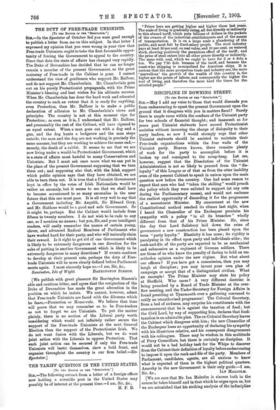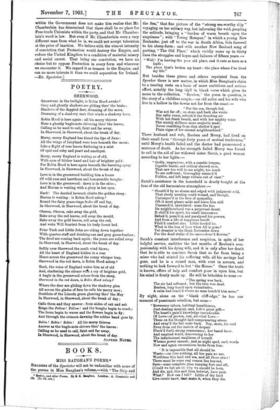DISCIPLINE IN DOWNING STREET.
[To THE EDITOR OF THE "SPECTATOR.']
SIR,—May I add my voice to'those that would dissuade you from endeavouring to upset the present Government upon the ground that it disagrees with you in matters fiscal ? Surely there is ample room within the confines of the Unionist party for two schools of financial thought ; and inasmuch as for years past Unionist stalwarts have nursed Protectionist societies without incurring the charge of disloyalty to their party leaders, so now I would strongly urge that other Unionist stalwarts should be assisted to maintain their Free-trade organisations within the four walls of the Unionist party. Heaven knows, there remains plenty of work for the party to accomplish before it is broken up and consigned to the scrap-heap. Let me, however, suggest that the Dissolution of the Unionist Administration is not so likely to proceed from the " dis- loyalty " of this League or of that as from the utter inability even of the present Cabinet to speak in unison upon the main question now before the country. One had some reason to expect that men who had "taken the shilling" would preach the policy which they were enlisted to support (at any rate during the Parliamentary recess), and would not embrace the earliest opportunity of discarding it for the programme of a secessionist Minister. My amazement at the new Constitutional method reached its climax last night, when I heard the Chancellor of the Exchequer proclaim his sympathy with a policy "in all its branches" wholly different from that of his Prime Minister. Sir, since the day that Lord Salisbury laid down the reins of government a new construction has been placed upon the term "party loyalty." Elasticity it has none ; its rigidity is paralysing in its effect upon party and individuals alike ; the rank-and-file of the party are expected to be as mechanical and submissive as a regiment of German soldiers. There are those of us who know the penalty of daring to hold an un- orthodox opinion under the new regime. But what about our officers ? If you have got a commission, then you may laugh at discipline ; you may invent your own plan of campaign or accept that of a distinguished civilian. What an example ! The Prime Minister may state his policy at Sheffield. Who cares ? A very different doctrine is being preached by a Board of Trade Minister at the over- flow meeting, and the Under-Secretary for Foreign Affairs is found presiding at Tynemouth over a gathering convened to ratify an unauthorised programme! The Colonial Secretary, from a bed of sickness, may surprise his constituents with the announcement that he is against the taxation of food ; but the Civil Lord, by way of supporting him, declares that food- taxation is an admirable plan. The ex-Colonial Secretary leaves the Cabinet which disagrees with him; the new Chancellor of the Exchequer loses no opportunity of declaring his sympathy with his illustrious relative, and his consequent disagreement with his colleagues. There may be wisdom in this multitude of Privy Councillors, but there is certainly no discipline. It would not be a bad holiday task for the Whips to discover from the Cabinet their definition of loyalty before endeavouring to impose it upon the rank-and-file of the party. Members of Parliament, candidates, agents, are all anxious to know what is expected of them in the highest political quarters. Anarchy in the new Government is their only guide.—I am,
Sir, &c., IAN MiLcoma. [We are sure that Mr. Ian Malcolm is sincere both in the course he takes himself and in that which he urges upon us, but we are astonished that his striking analysis of the indiscipline
within the Government does not make him realise that Mr. Chamberlain has determined that there shall be no place for Free-trade Unionists within the party, and that Mr. Chamber- lain's word is law. But even if Mr. Chamberlain were a very different man from what he is, we could not accept toleration at the price of inaction. We believe with the utmost intensity of conviction that Protection would destroy the Empire, and reduce the United Kingdom to a condition of material misery and social unrest. That being our conviction, we have no choice but to oppose Protection in every form and wherever we encounter it. We regard it as treason to the Empire, and can no more tolerate it than we could separation for Ireland. —En. Spectator.]































































 Previous page
Previous page